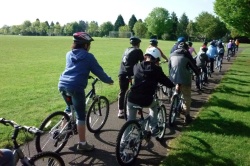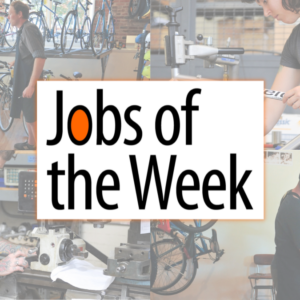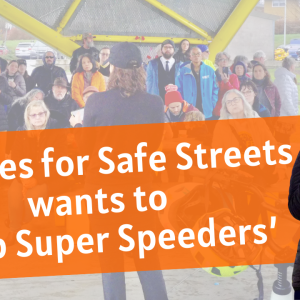
founder Eric Giacchino.
(Photo: Marcus Griffith)
The greater Portland metropolitan area is one step closer to having another regional non-profit bike education and advocacy organization.
The necessary paperwork to receive official non-profit status for the Clark County Cycling Coalition (C-4), southwest Washington’s newest bike organization, is complete and ready to be mailed, according to C-4 president Eric Giacchino.
Giacchino, a Vancouver fire fighter and Air Force veteran (profiled in The Oregonian earlier this year), explained that he has “tremendous” respect for the efforts of local volunteer bike projects (there’s a few), but he wants the Clark County area to have its own “umbrella” organization that promotes “polite, safe, cycling.”

course graduation.
(Photo: Eric Giacchino)
Designed as “a hybrid of the [Bicycle Transportation Alliance] and Community Cycling Center,” C-4 will use the Clark County Bicycle and Pedestrian Plan as “its guiding bible” in its efforts to improve cycling conditions in the local area, says Giacchino.
Vancouver and the rest of Clark County, falls in the advocacy gap between Portland-based Bicycle Transportation Alliance (BTA) and Seattle based Bicycle Alliance of Washington (BAW). Both the BTA and BAW welcome C-4 to the advocacy table.
Stating “the BTA wants to see more local advocates organizing in their communities,” BTA Communication Director Margaux Mennesson cited the importance of local organizations.
“The only true way to teach kids to be safe [when biking] on the road is to practice on the road,”
— Eric Giacchino
“Local groups are in powerful positions to address on-the-ground issues specific to that community…With a network of organizations working together effectively toward strategic goals, we can build a stronger, broader movement,” she shared via email.
The BAW is also pleased to have a potential advocacy partner in Vancouver.
“We’re delighted to have a non-profit to turn to and work together with in SW Washington. Although we’re a statewide organization, it’s difficult to effectively cover all the issues so we always seek the guidance of local advocates,” BAW Executive Director Barbara Culp stated via email.
The benefits of being a non-profit include “increased public credibility” and the “ability to solicit corporate donations,” according to Giacchino. The organization is staying busy as it completes the non-profit application process.
Recently, Giacchino completed a two week bike safety course at WyEast and McLoughlin Middle Schools in Vancouver for more than 300 kids. The course, conducted in conjunction with P.E. classes, included practice off and on public roads as a focus on real world scenarios, according to Giacchino.
“The only true way to teach kids to be safe [when biking] on the road is to practice on the road,” Giacchino said. C-4’s program incorporates education on the Rules of the Road, which also serves as a “first exposure to drivers ed,” according to Giacchino.
To celebrate the “graduation” from the two week program, Giacchino led approximately 30 students on an all-day, 25 mile bike “field trip” that included stops at the Vancouver water front and Vancouver Lake.
The ride is “intended to be a fun field trip… and a demonstration that bicycling is indeed a viable form of transportation.” said Giacchino. It also “proves to the kids they are capable of those kinds of distances.”
According to Giacchino, 15 fire fighters from the local fire fighter union volunteered their time to do the necessary inspections and maintenance on C-4’s 90 bike fleet in preparation for the school program. Additionally, the Vancouver Bike Club made a “generous donation” so that each “graduating” student could have a helmet.
To contact C-4, visit them on Facebook or email Giacchino at: giacchino1831 [at] comcast [dot] net.






Thanks for reading.
BikePortland has served this community with independent community journalism since 2005. We rely on subscriptions from readers like you to survive. Your financial support is vital in keeping this valuable resource alive and well.
Please subscribe today to strengthen and expand our work.
Now if only they could help get Vancouver’s helmet law repealed, or else reduced to only apply to children under the age of 18. Enforcement money could be used instead to help equip children with helmets.
On the up side, of a ridiculous helmet law, police will be so focused on highly visible cyclists without helmets that if you are wearing a helmet you should be able to run stop signs and traffic lights because they are SO focused on helmets.
There’s SO MUCH more to Vancouver’s bike scene than the damn helmet law.
I like the idea of teaching kids how to bike on the roads. Maybe it can become a mandatory part of schooling?
Great news, Go Clark County Cycling Coalition!!
What a cool program! Getting kids into cycling in a safe environment with good helmets is so important – go C4!
Vancouver firefighters teaching kids to ride in the road? As traffic? Vancouver isn’t Vancouver anymore.
I bet some of those kids felt like true champions after that 25 mile ride. This is great news. *happy dmc*
The BTA, and the rest of us, need to do more in the schools if it wants a new generation of cyclists to take to the streets.
We can’t out-spend the auto-mobile industry, but we can out-teach them.
There may be more to Vancouver than the helmet law but as someone who bikes there regularly because I work up there the helmet law says it all about what is wrong with Vancouver for cycling. There are serious safety issues with the vancouver bike network, but they involve expecting people to bike on 4 lane roads with a curb and no shoulder or bike lane where cars are traveling 40-50 mph. Vancouver has developed almost completely with the culdesac model and has few better option streets so many of their signed bike routes are patently unsafe, but the only thing that the city can think to do to improve things is to require people wear helmets. NEWSFLASH: if you are hit by a car going 40-50mph 90% chance you won’t live helmet or not.